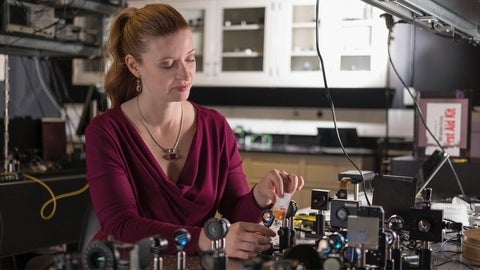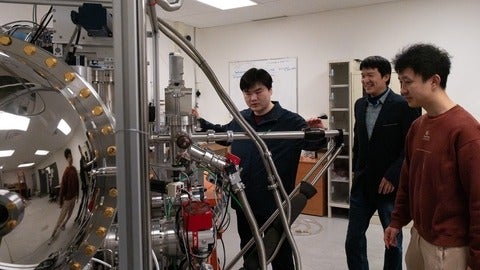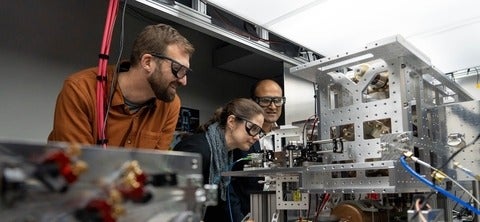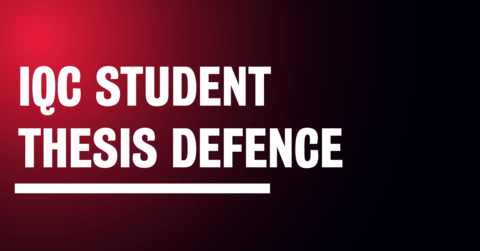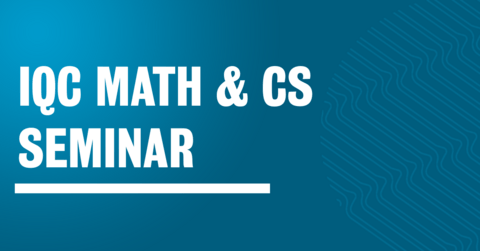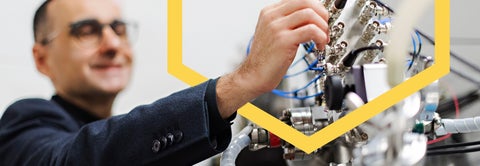
Welcome to the Institute for Quantum Computing
Harnessing the quantum world to empower the future
The Institute for Quantum Computing (IQC) is where world-leading researchers, students and partners come together to explore, understand and advance quantum information science.
From computing and communication to sensing and materials, our work drives the discoveries and innovations that will shape future economies.
Through global collaboration, hands-on training, breakthrough research and educational outreach, IQC is turning quantum research into real-world scientific and commercial impact.
Help shape the quantum future
Quantum systems have the potential to change everything from healthcare to cybersecurity to global communication. Your support for IQC fuels groundbreaking research, develops future scientific leaders and advances the innovations that will shape Canada’s economic future.
Why quantum?
We are driven by curiosity. It is a force that propels us to unravel the mysteries of the universe and apply our findings to transform society. Throughout history, humanity has advanced by learning to tame natural phenomena like fire, steam and electromagnetism.
Today, IQC is harnessing nature at its most fundamental level and the next era of innovation. Quantum systems have a distinct set of physical rules, offering us a new way to approach complex problems in speed, precision and security. By exploring these fundamental principles, we are building the innovations that will shape the next era of discovery.
The future is quantum and IQC is shaping it now.
Latest news from IQC
News
IQC appoints Dr. John Watrous in new director role set to expand the institute's educational programs
The Institute for Quantum Computing (IQC) has appointed Dr. John Watrous, former IQC faculty member and interim executive director, in a new director role set to expand the institute's educational programs.
Breaking the electromagnetic boundaries in ferromagnetic materials
Researchers at Transformative Quantum Technologies at the University of Waterloo are accelerating towards fully electrical spintronics for applications in data storage and medical imaging.
Building the world’s first open-source quantum computer
Open Quantum Design runs a new model for how quantum research is shared — opening doors for the next generation of scientists and entrepreneurs.
What's happening at IQC - Events
Events
IQC PhD thesis defence - Lars Kamin
From Asymptotic to Finite-Size Security in Decoy-State Quantum Key Distribution
Location: QNC 2101
IQC Math and CS seminar featuring John Bostanci
Separating QMA from QCMA with a classical oracle
Location: QNC 3206
IQC PhD thesis defence - Christopher Xu
Analog Emulation of Hyperbolic Space and Coherence Effects in Superconducting Circuits
Location: QNC 2101
What's happening here in Waterloo is truly special, from theory to experiment and BEYOND.
Statement in support of protecting Canadian science and researchers
The Institute for Quantum Computing (IQC) supports the efforts of the Government of Canada to secure and protect Canadian science and researchers. IQC takes the protection of intellectual property very seriously and commits to cooperate with various agencies and organizations in support of National Security priorities.
IQC also commits to, and will continue to, educate staff and researchers about the opportunities, pitfalls, and boundaries of protecting Canadian science and intellectual property for the benefit of IQC, the University of Waterloo, and indeed, future generations.
